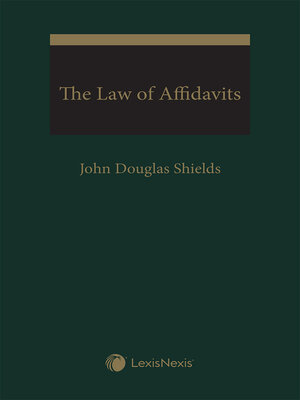
Sign up to save your library
With an OverDrive account, you can save your favorite libraries for at-a-glance information about availability. Find out more about OverDrive accounts.
Find this title in Libby, the library reading app by OverDrive.



Search for a digital library with this title
Title found at these libraries:
| Loading... |
As author and veteran litigator, John Douglas Shields, maintains, "Affidavits are a craft, requiring insight, experience and patience, peppered with limited artistic licence. Cases can be won on artful and careful drafting or lost on the shoals of an affidavit that should never have left the printer."
To help fellow practitioners develop winning affidavits – and also "properly and ethically decimate the opponent's case" – Shields has drafted this new volume, The Law of Affidavits, based on his decades of experience as a litigator and his meticulous research that included reviewing over a century of jurisprudence and approximately 5,000 cases.
A Comprehensive Reference
Unique in the litigation resource landscape, The Law of Affidavits is the first book in Canada to focus exclusively on affidavits, which have become the most prevalent and important form of evidence in litigation.
This detailed reference book sets out best practices when it comes to both drafting and objecting to affidavits, backed up by the applicable case law and extensive technical guidance. Relying on the Rules of Court for British Columbia – which are similar to rules governing affidavits across Canada – Shields provides lawyers, judges and masters with access to the law and jurisprudence related to these critical documents, with authorities cited from Canada.
The Law of Affidavits is a comprehensive volume, examining affidavits from a variety of perspectives, including as part of criminal law and family law matters, as well as affidavits from lawyers and legal staff. By addressing everything from drafting rules and techniques, to common pitfalls, to tried-and-true methods for critically examining and challenging affidavits prepared by opposing counsel, this book sets out the law and ethical and professional obligations for any lawyer preparing, or defending, an application or Summary Trial, or in dealing with affidavits and statutory declarations.
Indispensable for Litigators
Anyone involved in the practice of law will benefit from adding The Law of Affidavits to their bookshelf or desk, including:






